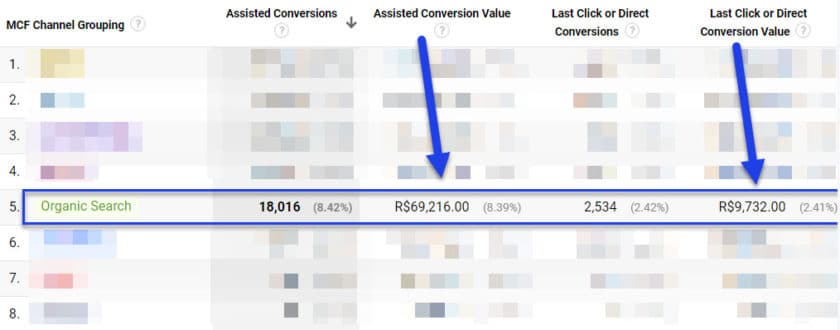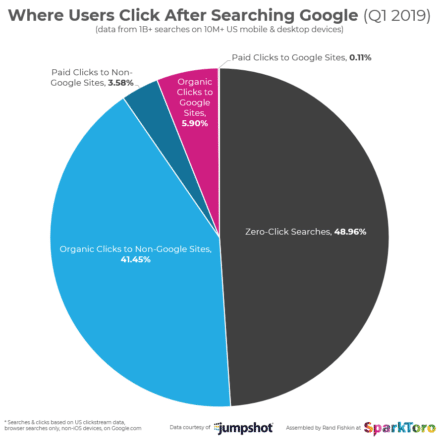If you are an analyst, consultant, or work in an agency you must have experienced some objection to investing in SEO. Who has never?
First of all, explaining SEO is not as easy as it sounds. Making an“ elevatorpitch ” about search engine optimization may work, but often you will end up forgetting to present something important.
Then there is a false understanding that because search engines are free, so is SEO. Or at least it requires low investment. Wrong and wrong!
In this article I bring you 6 objections that I have observed in my SEO consultancies. Of course there are many others, but I will show you the ones that I consider to be the most frequent and that plague SEO professionals.
Index
“Other channels perform better!”
This is a classic. Many companies use it especially in the negotiation phase, either to bargain or to make the SEO professional feel less confident about their field.
There are a few ways to answer this objection:
Success Follows Investment
It is much easier to find in companies professionals and teams dedicated to sponsored links and social networks than to SEO.
Aside from investing in human resources, they invest significant amounts in sponsored link campaigns, material production, video editing, and more. Of course, if you invest zero in SEO the return will be lower than other channels with more investment.
For an SEO strategy to be successful it needs investments.
Each channel has a purpose
Each channel will play a different role, depending on the segment in which the company operates. In general, social networks do not generate that many conversions but are good for generating engagement. PPC (sponsored links) generate more conversions (especially when we look at the attribution model with last click focus).
Organic search is generally a top and middle funnel channel. It may convert, but its main function is to attract and educate your target audience.
Conversions and assisted conversions
Even though it is not a channel with high conversion rates, organic search tends to play a key role by assisting in the remaining conversions.

“Search results only display ads.”
This objection is made by skeptics who rarely find what they are looking for in Google.
What search results are you looking at?
If you search for something bottom of funnel of course there will be a higher incidence of ads, but this will not be the case for most searches.
Two studies are interesting to answer this objection.
A study by Varn, conducted in the UK, shows that 35% of respondents recognize an ad in searches and do not click on them. 58% of the respondents stated that they do not recognize an ad in the SERPs.
Another study showed that only 3.58% of searches result in ad clicks:

How can these two things exist at the same time? Easy! Most searches do not trigger ads. Searches that are more informational and navigational tend to activate less advertising.
Search Intention
Take into account the user’s search intent.
Often your target audience is looking for more information about a product or service. They are making comparisons. If you focus only on the bottom of the funnel you may be disappointed when it comes to search engine optimization.
Learn more about search intent.
All channels are complementary
Always keep in mind that the various acquisition channels tend to work better together. I wrote an article some time ago about how SEO and PPC can work better together.
There are studies that show a high average CTR when organic and ads results appear together in the SERP.
“SEO generates traffic but not the right traffic.”
In general people who use this objection either cannot understand how an SEO campaign works, or they mean something else.
Branded vs. non-branded
Many are saying that SEO only generates traffic forbranded terms. This may even be true, but only if you are doing it the wrong way.
If your SEO strategy is well formulated, you will improve your exposure (impressions and clicks) in searches for both branded andnon-branded terms.
Assisted conversions are important
As I mentioned earlier, while organic searches are (in general) not a high conversion rate channel, they tend to play a key role assisting the other channels in their conversions.
The traffic generated can be highly qualified
This statement will only be true if you are paying attention to your target audience. If you know what they search for, how they search, what terms they use, and what is important to your brand, then you will get qualified traffic through searches.
See that to achieve all this you need to invest (staff, content, analytics, UX). You can’t achieve state of the art SEO without the right investment.
“SEO takes too long to yield results.”
Perhaps the most common objection and one that we SEO professionals hear most often (more than we would like).
SEO is not a growth hack
SEO is not a growth or inbound marketing technique.
Many companies get anxious when hiring SEO consulting thinking that they will get immediate results. Sorry to inform you, but that’s not what SEO is for.
Search engine optimization is a culture!
Methodology + time = growth
As I said before, SEO is culture. It is more methodology than tactics. It is something that must be ingrained in everything the company does. In time, this culture will bring results.
“You can’t measure SEO results.”
Yes, it is possible!
We often see companies and even marketers saying that it is not possible to measure the ROI of SEO. They use this argument to not target or reduce the resources available for organic traffic generation.
Predicting ROI
It is possible, using data from the site itself, to build a click-through-rate curve per search position. By merging this information with search volume for certain keywords for which we want to rank, it is possible to estimate the traffic if we gain search positions.
Generally, by improving your site for a main term, traffic will increase above the estimate. This is because you may also have improved positioning for other similar long-tail terms.
Measuring SEO ROI
The key here is to demonstrate that it is possible to link SEO to the result (revenue). If you have an online store, chances are that your analytics tool is already tracking conversion figures. In this case, visualizing the result of an SEO campaign can be easier.
However, if your site is not e-commerce, we will need some more information to calculate the ROI of an SEO campaign. One way to do this is to take the customer’s LTV (lifetime value) and multiply it by the conversion rate.
If you have this information, register the conversion values as goals in your Google Analytics. This will allow you to more accurately analyze the importance of each page, group of pages, or user segments.
Similarly, expand this analysis to assisted conversions. Remember that analytics tools typically bring up conversions based on the last click attribution model. Analyze other attribution models (e.g. linear, first and last click, increasing, etc.) to see the real value of SEO campaigns for the site.
Read also: SEO ROI: how to calculate the value of organic traffic
“SEO is a lot of work!”
SEO is a lot of work, yes!
I’ll tell you what is the most work:
- Be on the second page of Google.
- Permanently investing in PPC campaigns because they fail to rank for terms important to the business.
- Make a sale when the prospect does not see authority in your brand, since you have not produced any content on a topic that interests him.
- Having to produce content after content, every day, when you don’t have an SEO strategy for evergreen content production.
- Running after social media traffic or activation (push, newsletter, WhatsApp, etc.) every month for not ranking well in search.
I could go on for topics and more topics but you get the message.
SEO takes work, but it also works.
In conclusion
For every objection there is at least one good argument to convince that SEO is a good investment, especially in the long run.
When it comes to search engine optimization, always keep in mind:
- Success depends on investment;
- Each acquisition channel has a purpose;
- Look at conversions and also assisted conversions;
- SEO, in general, is aimed at top and middle funnel;
- Understand what the user’s search intent is;
- All channels are complementary;
- SEO strengthens branded and non-branded terms;
- Assisted conversions are important (again);
- Traffic generated organically can be qualified;
- SEO is not a growth hack;
- Methodology + time = growth;
- It is possible to predict SEO ROI;
- It is possible to measure the ROI of SEO.
Last but not least: SEO is a lot of work! But it is more work not to do SEO.
